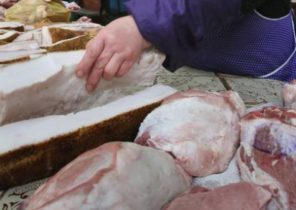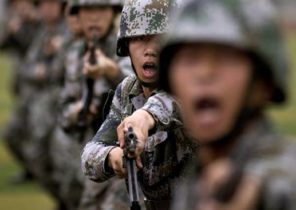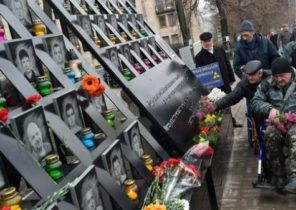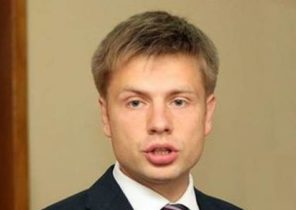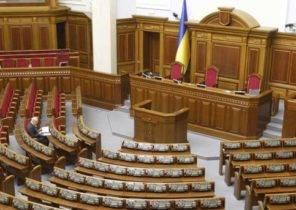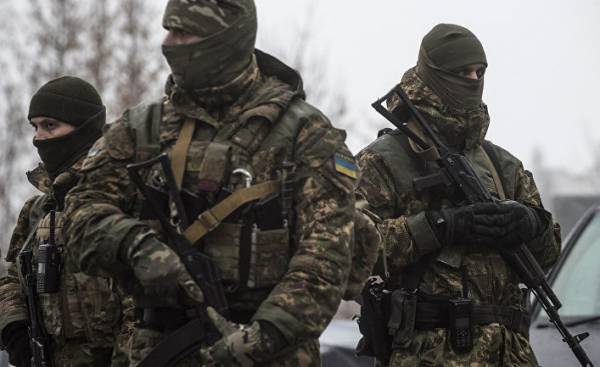
The small town of Pisco is located closest from Donetsk airport under control of Ukrainian army. A few kilometers before the entrance, under one of the blown highway bridge is a checkpoint that you must pass to get into the village, near which hostilities are taking place, since the summer of 2014. Burnt skeletons of tanks for a few kilometers as if to warn us about the proximity of the combat zone. Dirty and tense faces of the soldiers at the checkpoint, in fact more children in uniform, telling us about how hard a life here, despite the Minsk agreement on ceasefire, 2015.
Our guide is a priest of the Ukrainian army, which is now, on Holy Saturday is going to pray for the soldiers fighting in this sector. It’s friendly, not very tall man with a direct gaze, always tenderly looking at him. He looks a bit ridiculous in uniform, which is way too big for him, sits by the bag and in General seemed made for him. He reminds me of a Mexican comedian Cantinflas (Cantinflas), though with a Slavic appearance. It seems somehow unnecessary, but only until, until you see how he interacts with the soldiers until you see how battle-hardened men come down from the armored vehicles, to ask his blessing.
A few meters away, on the command post of the assistant of a chaplain and several staff soldiers prepare a large table on which lay the sausages, cheeses, sweets and Easter eggs. Table covered with a white cloth, on which lay liturgical book and a tank of Holy water. I have the impression that soldiers think more about bread with lard than about God. Who about what, as they say… And here I am today not had Breakfast.
After the service, the military return to their positions. Led by the captain of the airborne troops and his band we are the Squeaks. Small houses interspersed with grey block buildings of the Soviet era. There is no building without traces from bullets, all glass in the Windows shattered, and the houses are a pile of splinters. They are destroyed by the artillery fire of the rebels (i.e. Russian, although writing about it is impossible).
We make our way along the narrow trench to reach the front, without going into the open. Bowing of the head, we go in single file, then run not to get under fire of snipers. The distance is about 500 meters. I can’t resist in order not to think about how it must be exciting to catch sight of several men in helmets, running with all his might, as if they compete for a prize at the fair. “As if my head was not given the prize, God forbid, that rifle also appeared as the fair” — I think.
Exiting the trench located behind the old store. It is closest to the enemy line of fire. Defending her about ten servicemen of the Ukrainian army. With the exception of two men sent to Supervisory positions, they are all resting outside, catching the first rays of the spring sun. Drinking tea and talking incessantly smoke cigarettes, while from the North-East is heard the continuous crackling of heavy machine guns Degtyareva-Shpagina, accompanied by a whistle issued from the mortar shells. This happens every day, side remind one another that, despite the birds singing, the war continues. It’s not fire, and the fire in order to break the enemy’s morale.
Dima, 24 years old, he is from Lviv, in Western Ukraine. He came to the position to chat with a friend from his district, with whom he went into the army. He stares at the two journalists who were here, and starts talking to us in perfect English. Almost immediately, as if reflective, he began to tell about his homeland, about his fiance, soccer team, about how he wants to drink beer with his friends: “We arrived in December for three months, it is now the end of April, and everyone is silent, only come in trucks with ammunition”.
In the words of this young man felt depressed after the winter, soaked with blood. “Look around, Manu lived about three thousand people, today there are seven. Whenever I look around…”. He sighs and smiles at me. I’m trying to understand the expression on his face, but I can’t. He asks me to follow him into the building. From the height of the third floor through the small holes for shooting and views of the surroundings.
Seeing the wreckage of the destroyed Church, I can not remember, in what turned during the Civil war, the town of Belchite (Belchite), and I can come up with the idea that man is doomed to repeat its atrocities.
Marijuana, Jihad and skinheads
As worthy successors of the red army, the Ukrainian Armed Forces is too bureaucratic. After going through all conceivable instance, we finally met with the press Secretary Elena, responsible for the sector of Marinka. She was waiting for us in a Lada Niva with tinted Windows. When we caught up with her car, lowered windshield. Blonde beauty with puffy lips and pink cheeks. We greeted each other.
“Barbie doll in camouflage uniforms. If she is going to detain me for the sake of this I am ready to go on the side of rebels” — we were joking, following Elena’s car until they drove to headquarters, where we must be submitted to the authorities and explain the purpose of our visit. Leaving the car, we forgot about all the jokes and began to behave like respectable gentlemen.
After a long explanation that we wiped out the bosses, our beloved Elena, have achieved their goal: to spend a few days in one of the military units stationed in the area of Marinka. We jumped into a battered van on the windscreen which displayed the familiar inscription in Arabic: “God is one”. On the side Windows of the inscription in English: “Bus Jihad” and “Free Gaza”. The driver — a former Chechen militant who joined the Ukrainian army. On his head is a typical Sunni headdress. Chechens, Georgians, Uzbeks… In the Ukrainian army, you can see the representatives of the republics, the Russian Federation still talking from a position of strength.
Part is Mar hospital. The building was badly damaged by the shells of the rebels. You can only use the third floor, which houses military personnel. The top two floors come in greater disrepair with each shelling. Commander name is “Pirate”, he’s 26 years old, he is from Donetsk region. Red-haired, with lively eyes. “Sit down and come to my room,” he says in quite good English.
In the room directly on the floor on two mattresses and a few blankets, a low table. Soon they brought us a heater, kettle and all the tea. I also brought cigarettes, because mine were gone, and for two hours I shoot them at the oncoming soldiers.
The Pirate room is decorated with emblems of his favorite football team “Shakhtar” (Donetsk) and different subjects, such as marine plastic hook, hat, drum… the feeling that he takes his nickname very seriously, and the war — with black humor. Telling us about the situation at the front, and the upcoming night of the operation, he puts on the table a package of marijuana. “Smoke?”, — he asked me. Gives me a smile, and he pulls out of the closet fixture made from a plastic bottle and drilled shells, where lays the potion. “The mortar,” he says, pointing to the instrument, blowing smoke and offering it to me.
In a strange monastery with its Charter, not walk. Having smoked, we sit in Jihad-van and sent to the remote location. Chechen vengeance presses on the gas, we pregiven head, rolling from one side to the other and shouting “Allah Akbar”, but here it means nothing.
We’re going to the most dangerous point of Marinka, which, like other areas adjacent to the demarcation line, is under the control of the “Right sector” (an organization banned in Russia — approx. ed.), ultra-nationalist organizations, long involved in the fighting. Surrounded by three of the four flanks, about 20 men differ on three barracks and one house built around a small basketball court. All buildings, walls riddled with bullet holes, roofs destroyed and Windows smashed. In war as in war.
We were met by the commander of the group, whose name is Diesel. It is a harsh looking man two meters tall with shaved head in a baseball cap. On the face of a noticeable scar. On the right sleeve of his patch with the Trident, terrify. “Welcome to hell, brother!”,- he throws a smile, and his subordinates laugh at his joke.
Diesel takes the sign, and we all go into the room that serves as the command post. He invites an interpreter, and a few fighters out of curiosity, come to us. Among them Maxim, timid and insecure young man, but extremely intelligent. “Well, you already know that we here are eating Russian children, so we’re any of them will be caught,” he says with a smile, as if commenting on the rumors that spread about them Pro-Russian media.
The soldiers took places according to the orders, darkens, and in the center of the basketball court is installed a hybrid of mortar and rocket-propelled grenade, made a big invention. Mino-a grenade launcher shoots the first shell, and a few seconds from a distance you hear the dull sound of an explosion. On the opposite side starts indiscriminate fire from sniper rifles and AKS. Chechen rush with a grenade launcher from cover to cover, and we scurry between positions, looking for the best shots.
They woke the beast and now we hear the whistle of bullets over our position. Tracer bullets fly through the no man’s space, leaving behind the beautiful red lines that intersect in the dark. A surplus of adrenaline makes us feel young children. Shooting is devoid of any meaning, there are no goals for several years now, but sometimes you need to make some noise… At least, so says the Pirate who is with us. Not so much to protect us much to appreciate.
After about 30 minutes, again heard the explosions of shells. We go to the shelter, let the rebels let off steam. Pirate and Chechen show us that it’s time to go to the hospital. We say goodbye to Diesel, which invites us again to visit them when we want. The minibus starts to move in a way and we are back with extinguished lights, not to become a target for snipers. On arrival, the Pirate warns us: “If they start shelling, leave the room and stand in the hallway, away from Windows”. At 3.30 am I hear the voice of his friend: “I Went into the corridor, firing started”.
I just need to get out of the sleeping bag and grasp the instrument. I have long learned to sleep in my shoes and prepared equipment. Shells hit the upper floors of the hospital, but soldiers at this time, exchange glances, nervous smiles and cigarettes. Inside the shelling does not seem so scary, and, having waited a reasonable time after the cessation of tears, back to your bed, unhappy that they are disturbed during sleep. Tomorrow we decided to stay with Diesel and his henchmen.
At 7 a.m. we are again in the position controlled by the “Right sector”. This time we decided to bring all of our stuff and spend the night in this place, where the smell of gunpowder and war. Diesel meets us and mockingly raises his hand in a Roman salute “Heil!”. I could take this seriously, but even he does not. He is just playing the role that he ascribes to the world press. I only stand before him at attention and presented a volunteer, which I am not and never will be. We hug, and he immediately sends me with Maxim, the interpreter, who became our babysitter.
War may seem very boring when there is nothing to do, and I pass the time, Smoking jambs with Maxim, talking about the divine and the human. We’re talking about his photography, about his wife being a teacher, his duty to the country and how once he changed his damn camera on the rifle and eventually became the “Secretary” Diesel, which fluctuate between love and hate. “He constantly says me that I forget everything. Sometimes even beats me black Comforter” – so called black police truncheon that Diesel always keeps at hand. Schools with marijuana ended, the conversation is coming to an end. If nothing changes, and today the war will be boring. I go lie down on the cot, read, relax until the evening, when usually starts firing.
Goodbye, Basil!
Two soldiers stand guard at the tomb of Basil. On the right hand school chairs sitting grief-stricken family and looking with unseeing eyes at the face of the deceased, which with makeup trying to put in order. Harsh father, trying to hold back the tears, and grief-stricken mother, endlessly muttering unintelligible prayers. There also is a widow, disconsolately staring at the flowers laid in the coffin. Her pain is expressed in the nervous twitching of the lips, as if she wants to say something, but can’t.
A bit further there are rows of chairs, on which the rural woman. Today they are all in black shawls. Stand behind them, and out of the villagers and the soldiers to say a last farewell to his countrymen, friend, military…
Clouds cover the sky over the village Berestovets, the cold wind howling in the trees, which have not yet blossomed buds, drowning out the voices of the soldiers who are going to move the coffin into the Church. Dozens of people gather on both sides of main street, and meanwhile we drive all the new cars. For local residents, mostly farmers, Basil is not just a villager: he heroically fell in battle…
When you begin the funeral procession, surmounted by a large cross, people kneel and bow their heads. Open coffin carry colleagues on their shoulders. All men remove hats, women strew with flowers the ground on which the moving procession. Only heard the hysterical sobs of the widow, which has barely enough strength to hold the portrait of a loved one. Photography has little to do with the disfigured face of the victim. The tank is not only deprived of Basil’s life, but left in memory of people his disfigured face, as if making him a stranger.
Basil served in Avdiivka, in the machine-gun calculation, deployed a few kilometers from the coke plant, thanks to which the lives of the village. That Friday was the fifth day without collisions. The Easter truce was respected, the men in the position of talking animatedly with each other. Another cigarette, another coffee and other ways to fight the boredom. The first enemy shells forced everyone to be on the alert, and soon a direct hit deprived of all their lives. All run with distorted faces screaming. Wailing ambulances, and the whole earth covered with blood. While there is a funeral, here are the soldiers convey the story from mouth to mouth. Then to the accompaniment of a brass band procession goes to the cemetery.
Next to the freshly dug grave, on which there are plates, a man in his fifties sitting on his haunches and cries from time to time applying to the bottle of vodka. Lights up and sighs. Tall, lean, with enormous hands, his flushed face and watery eyes saying that this is not the first bottle of vodka, which he poured in this morning. The funeral procession enters the cemetery. “First my son and now nephew. Family lost everything due to the Kiev mafia… All the time the same. All the time,” he says, referring to the Kiev government.
His voice turns into mumbling. Another SIP from the bottle.
The priest blesses the grave, while the comrades of the deceased prepare the ropes to lower the coffin. Hundreds of people approach the coffin to say goodbye with the deceased. The widow stroked the face of Basil, kisses him, makes him the index finger to remember him forever: “My Bob, my love…”. She slightly raises her eyes to realize what is happening, stares at all the people around her, and again kissing the cold face of Basil: “My Bob, my love…”.
Two soldiers close a coffin lid and nailed with four nails. The silence was ruined by a triple salute from rifles. “My Bob, my love…”.
